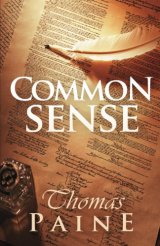Common Sense Page #15
Common Sense is a pamphlet written by Thomas Paine in 1775–1776 advocating independence from Great Britain to people in the Thirteen Colonies. Writing in clear and persuasive prose, Paine marshaled moral and political arguments to encourage common people in the Colonies to fight for egalitarian government.
First. Because it will come to that one time or other. Secondly. Because, the longer it is delayed the harder it will be to accomplish. I have frequently amused myself both in public and private companies, with silently remarking, the specious errors of those who speak without reflecting. And among the many which I have heard, the following seems the most general, viz. that had this rupture happened forty or fifty years hence, instead of now, the Continent would have been more able to have shaken off the dependance. To which I reply, that our military ability, at this time, arises from the experience gained in the last war, and which in forty or fifty years time, would have been totally extinct. The Continent, would not, by that time, have had a General, or even a military officer left; and we, or those who may succeed us, would have been as ignorant of martial matters as the ancient Indians: And this single position, closely attended to, will unanswerably prove, that the present time is preferable to all others. The argument turns thus-- at the conclusion of the last war, we had experience, but wanted numbers; and forty or fifty years hence, we should have numbers, without experience; wherefore, the proper point of time, must be some particular point between the two extremes, in which a sufficiency of the former remains, and a proper increase of the latter is obtained: And that point of time is the present time. The reader will pardon this digression, as it does not properly come under the head I first set out with, and to which I again return by the following position, viz. Should affairs be patched up with Britain, and she to remain the governing and sovereign power of America, (which, as matters are now circumstanced, is giving up the point intirely) we shall deprive ourselves of the very means of sinking the debt we have, or may contract. The value of the back lands which some of the provinces are clandestinely deprived of, by the unjust extention of the limits of Canada, valued only at five pounds sterling per hundred acres, amount to upwards of twenty-five millions, Pennsylvania currency; and the quit-rents at one penny sterling per acre, to two millions yearly. It is by the sale of those lands that the debt may be sunk, without burthen to any, and the quit-rent reserved thereon, will always lessen, and in time, will wholly support the yearly expence of government. It matters not how long the debt is in paying, so that the lands when sold be applied to the discharge of it, and for the execution of which, the Congress for the time being, will be the continental trustees. I proceed now to the second head, viz. Which is the easiest and most practicable plan, reconciliation or independance; with some occasional remarks. He who takes nature for his guide is not easily beaten out of his argument, and on that ground, I answer generally--That independance being a single simple line, contained within ourselves; and reconciliation, a matter exceedingly perplexed and complicated, and in which, a treacherous capricious court is to interfere, gives the answer without a doubt. The present state of America is truly alarming to every man who is capable of reflexion. Without law, without government, without any other mode of power than what is founded on, and granted by courtesy. Held together by an unexampled concurrence of sentiment, which is nevertheless subject to change, and which every secret enemy is endeavouring to dissolve. Our present condition, is, Legislation without law; wisdom without a plan; constitution without a name; and, what is strangely astonishing, perfect Independance contending for dependance. The instance is without a precedent; the case never existed before; and who can tell what may be the event? The property of no man is secure in the present unbraced system of things. The mind of the multitude is left at random, and seeing no fixed object before them, they pursue such as fancy or opinion starts. Nothing is criminal; there is no such thing as treason; wherefore, every one thinks himself at liberty to act as he pleases. The Tories dared not have assembled offensively, had they known that their lives, by that act, were forfeited to the laws of the state. A line of distinction should be drawn, between, English soldiers taken in battle, and inhabitants of America taken in arms. The first are prisoners, but the latter traitors. The one forfeits his liberty, the other his head. Notwithstanding our wisdom, there is a visible feebleness in some of our proceedings which gives encouragement to dissensions. The Continental Belt is too loosely buckled. And if something is not done in time, it will be too late to do any thing, and we shall fall into a state, in which, neither Reconciliation nor Independance will be practicable. The king and his worthless adherents are got at their old game of dividing the Continent, and there are not wanting among us, Printers, who will be busy in spreading specious falsehoods. The artful and hypocritical letter which appeared a few months ago in two of the New-York papers, and likewise in two others, is an evidence that there are men who want either judgment or honesty. It is easy getting into holes and corners and talking of reconciliation: But do such men seriously consider, how difficult the task is, and how dangerous it may prove, should the Continent divide thereon. Do they take within their view, all the various orders of men whose situation and circumstances, as well as their own, are to be considered therein. Do they put themselves in the place of the sufferer whose all is already gone, and of the soldier, who hath quitted all for the defence of his country. If their ill judged moderation be suited to their own private situations only, regardless of others, the event will convince them, that "they are reckoning without their Host."
Translation
Translate and read this book in other languages:
Select another language:
- - Select -
- 简体中文 (Chinese - Simplified)
- 繁體中文 (Chinese - Traditional)
- Español (Spanish)
- Esperanto (Esperanto)
- 日本語 (Japanese)
- Português (Portuguese)
- Deutsch (German)
- العربية (Arabic)
- Français (French)
- Русский (Russian)
- ಕನ್ನಡ (Kannada)
- 한국어 (Korean)
- עברית (Hebrew)
- Gaeilge (Irish)
- Українська (Ukrainian)
- اردو (Urdu)
- Magyar (Hungarian)
- मानक हिन्दी (Hindi)
- Indonesia (Indonesian)
- Italiano (Italian)
- தமிழ் (Tamil)
- Türkçe (Turkish)
- తెలుగు (Telugu)
- ภาษาไทย (Thai)
- Tiếng Việt (Vietnamese)
- Čeština (Czech)
- Polski (Polish)
- Bahasa Indonesia (Indonesian)
- Românește (Romanian)
- Nederlands (Dutch)
- Ελληνικά (Greek)
- Latinum (Latin)
- Svenska (Swedish)
- Dansk (Danish)
- Suomi (Finnish)
- فارسی (Persian)
- ייִדיש (Yiddish)
- հայերեն (Armenian)
- Norsk (Norwegian)
- English (English)
Citation
Use the citation below to add this book to your bibliography:
Style:MLAChicagoAPA
"Common Sense Books." Literature.com. STANDS4 LLC, 2024. Web. 25 Nov. 2024. <https://www.literature.com/book/common_sense_270>.




Discuss this Common Sense book with the community:
Report Comment
We're doing our best to make sure our content is useful, accurate and safe.
If by any chance you spot an inappropriate comment while navigating through our website please use this form to let us know, and we'll take care of it shortly.
Attachment
You need to be logged in to favorite.
Log In